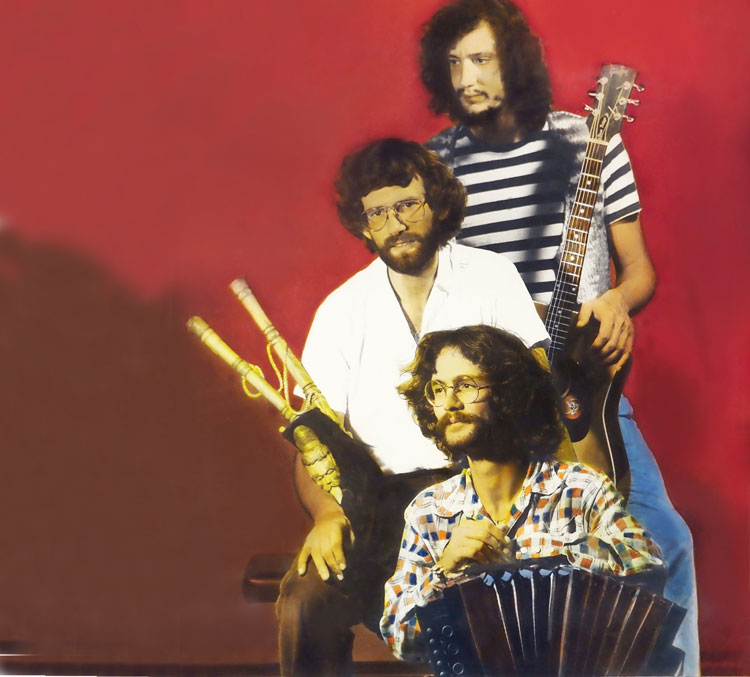Pijpekruid – 1978 -1981 (Pan Records, 2023)
The album titled Pijpekruid – 1978-1981 (Pan 234, 2023) presents a notable addition to the extensive repertoire of folk bands that emerged during the folk revival era spanning from 1975 to 1985 in the Low Countries.
While numerous bands of this period gained recognition both domestically and internationally through the release of their diverse LPs, such as Fungus, Rum, and Wolverlei, Pijpekruid stands out as an exception, never having produced a full-length album despite possessing undeniable musical talent.
Pijpekruid cultivated a distinctive and identifiable sonic identity. The ensemble featured three accomplished bagpipe players, which ultimately led to the band adopting the name “Pijpekruid,” aptly derived from the Dutch term “pijpen,” meaning to play the bagpipe. Their characteristic sound not only captivated audiences but also contributed to their reputation within the folk music scene.
When curating the selection for the CD, an abundance of suitable material was at the label’s disposal, to the extent that it could have effortlessly filled a double or triple CD compilation. However, the intention was to strike a balance and avoid excessive content. Consequently, the decision was made to primarily include live recordings, effectively serving as a commemoration of the vibrant and energetic atmosphere that Pijpekruid exuded during their stage performances.
It is worth noting that “pijpekruid” refers to a herb known as Pipewort in English, further showcasing the band’s inclination towards incorporating natural elements into their artistic identity.
Pan Records’ founder and producer Bernard Kleikamp says about the album: “For me, this CD puts something right. I’ve always been of the opinion that Pijpekruid deserved an LP during the folk revival. That LP never materialized. Pijpekruid was one of my favorite groups and I always had a great time at their performances. At that time, the late 1970s and early 1980s, I was not yet a record boss, I only became one in 1988, but then Pijpekruid no longer existed. But I had never forgotten the LP idea. A few years ago I suggested to the exmembers of Pijpekruid to make a selection from the material that was there and to release a CD, and that idea was enthusiastically received. Pan Records still had a few concert recordings on tape from Pijpekruid in its archive. The ex-members of Pijpekruid still had home studio recordings of demos. These recordings have all been digitized in recent years, some even remixed. The members of Pijpekruid have made a selection of these. For Pijpekruid and me this CD completes the circle.”
Multi-instrumentalist Frank Uiterwaal provides details about how Pijpekruid came about: “In June 1976 we got together at a wedding as an occasional formation. We liked it, so we decided to join forces in a new music group. There were three of us, Rembert Weijers, from De Speellieden van Gelre, Louis Debets, from the folk group Vagant and Frank Uiterwaal from Het Luijaardsgild’. Under the name Fluitekruid we played Dutch folk, supplemented with music from the Middle Ages and Renaissance. With a lot of instruments, bagpipes, shawm, clarinet, hurdy-gurdy, crumhorn, flutes, violin, mandolin, banjo, guitar and percussion, we played at art markets, historical parties, Burgundian evenings, music festivals and in folk clubs in the Netherlands and abroad.
We soon found out that the name Fluitekruid or Whistlepowder was very popular among folk musicians. We then renamed ourselves “Pijpekruid”. (We played a lot of bagpipes, in Old Dutch that was called pipes, hence.) At the Ghent Fieste we met Mark Söhngen, the specialist on harmonica, concertina, and accordion. He joined our party. A nice addition, because not only is he a fine musician, he has also done a lot of fieldwork in the field of old Brabant folk music, so that we have acquired a unique repertoire.
The music we made? Folk music from the low countries, in a wonderful mix of styles. Old, modern, Irish, French, with classical and modern instruments, always acoustic.
In 1979 Nelleke van der Krogt joined our company for a short time. In 1980 the three of us continued, Rembert, Mark and Frank.
On January 18, 1981, we did our last performance in the Theater aan de Haven in Scheveningen. It had been nice. Too bad we never made a record or CD. Until now, actually.”
Track List:
01 Moeder Porret (Mother Porret) 1:08
02 Springdans van Rett (Rett’s jumping dance) 1:59
03 Meneer de Graaf (Mister de Graaf) 4:02
04 Narrendans (Fool’s dance) 3:12
05 Siberië (Siberia) 2:50
06 Daar Achter in Die Velden / De Blauwe Boer (There at the back of the fields /The
Blue Farmer) 3:58
07 Jan Klinkbol 2:00
08 Wat Zal Men op den Avond Doen (What is one going to do in the evening?)
3:22
09 Schots van de Miwwus (Miwwus Schottische) 2:218
10 Tourdion 2:31
11 Zoeteliefjes (Sweet Loves) 1:43
12 Mark’s Doedel (Mark’ bagpipe tune) 2:57
13 De Dood (Death) 3:30
14 Mazurka 1:20
15 Trotto 2:38
16 De Nieuwen Hemel (The New Heaven) 3:18
17 Drie Belgische Dansen (Three Belgian dances) 3:07
18 Saltarello 2:59
19 De Haverkist (The Oat Box) 4:44
20 Groenelands Straatje / Bache Bene Venies (Streets from Greenland / Bache Bene
Venies) 2:05
21 De Bredase Boterboerin (The Butter Making Farmer’s Wife from Breda) 4:15
22 De Strontmolen / De Harlequin (The Shit Mill / The Harlequin) 3:40
23 Lustige Maagden (Lussty Maidens) 1:59
Totaal 66:30
Pijpekruid lineup: Frank Uiterwaal on guitar, violin, banjo, vocals, bagpipes; Mark Söhngen on accordion, concertina, trekharmonica (a kind of accordion), bagpipes, vocals; Rembert Weijers on bagpipes, mandolin, clarinet, vocals, sopranino-recorder, shaw, transverse flute; Louis Debets on guitar, mandolin, vocals, Turkish drum; and Nelleke van der Krogt on vocals, Turkish drum.


